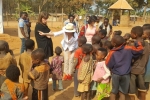Gillian Keegan: What steps she is taking to help eradicate HIV/AIDS in developing countries.
Alistair Burt, Minister for the Middle East: The United Kingdom is a world leader in efforts to end the AIDS epidemic, including through our major investment in the Global Fund, which provided 17.5 million people with treatment in 2017. We are working to expand access to treatment while reducing new infections, particularly among adolescent girls, women and other groups who face stigma and discrimination.
Gillian Keegan: I thank the Minister for his answer. Along with medication, education has been transforming the spread of HIV in the UK, with infections falling by 28% since 2015. In sub-Saharan Africa, however, three in four new infections among 15 to 19-year-olds affect girls, and globally young women are twice as likely to be infected with HIV as men their age. What steps is my right hon. Friend taking to curb HIV infections within the most vulnerable and susceptible groups?
Alistair Burt, Minister for the Middle East: I am grateful to my hon. Friend for that question. Women and young girls are indeed a vulnerable group in relation to AIDS. Ending AIDS as a public health threat by 2030 is a priority for the UK, which I was able to re-emphasise when speaking at the International AIDS Conference in Amsterdam earlier this year. Tackling AIDS is possible only if we target the most vulnerable populations, which we are doing by focusing on adolescents in the sexual and reproductive health programmes that we support.


